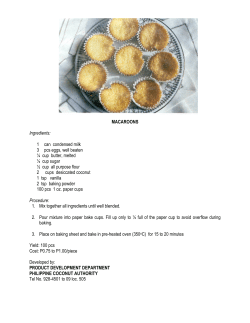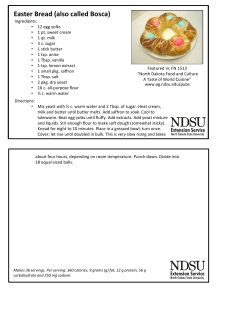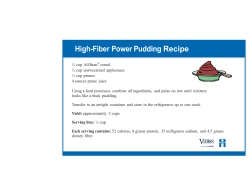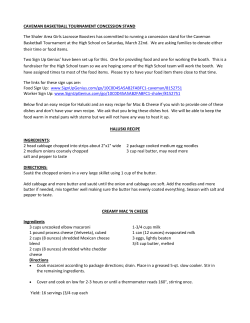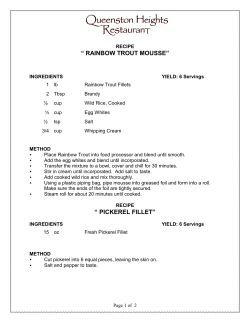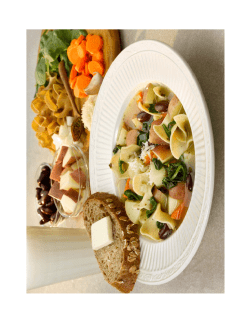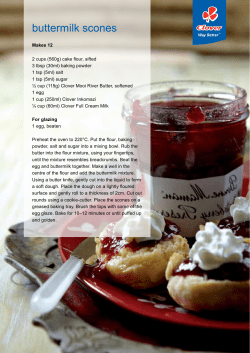
Now What? Y
You’ve been told to go home and feed your child Now What? Parents using the Maudsley approach to help their children recover from anorexia have to come up with menus that have enough calories to reverse the process of malnutrition. Itʼs a daunting task, and it usually requires a paradigm shift. Most of us have been taught from early on to cut calories, not add them. Weʼve been told to look for ways to cut back on fat, not add it in. But your child needs lots of calories and a balance of protein, fats and carbohydrates. Most people are surprised to learn just how many calories it takes to reverse the malnutrition of anorexia. (Some doctors are surprised about this, too.) While no one can explain exactly why this is true, the answer probably has to do with how the metabolism is altered by malnutrition. To read more about why so many calories are needed see these studies. Every child will gain weight at a different rate. Most families find the right level to support weight gain with a little trial and error. Your Maudsley therapist will help your family get on the same page, brainstorm solutions, and stay focused on restoring health. The tough job of translating that help into action at home falls to you. (If youʼre not working with a Maudsley therapist, you can look for other medical professionals to support you; See Working with a Non-Maudsley Team.) Since no two families eat in the same way, the recipes and feeding suggestions are meant to help you come up with menus that work for you. If youʼve got a recipe youʼd like to share, please email it to us at contact@maudsleyparents.org. Thanks to Craig, Ann E, Sarah, Ann F, Susan and Jane for parent-to-parent advice. Tips One of the challenges of the re-feeding process is the fact that nearly all those in recovery from anorexia experience some uncomfortable fullness and stomachaches. During starvation, the metabolism and digestive processes slow way down, and they must readjust when the child begins to eat again. Some people find that a warm heating pad over the stomach helps during and after meals. To cut down on stomachaches, as well as on the anxiety and fear of eating, many families try to fit their childʼs calorie requirements into the smallest possible footprint. This accomplishes several things: Itʼs efficient, it reduces the volume of food your child must eat, and it inevitably consists of high-quality, high-fat foods. Many families think about meal planning in terms of getting the most bang for their nutritional buck--bang meaning not just nutrients but also calories. In other words, if youʼre choosing between an ice cream with 140 calories per half cup and one with 270 calories per half cup, keep in mind that your child will have to eat less of the higher-calorie version. Early in recovery, thatʼs usually a good thing. Youʼll probably want to plan meals around foods your child used to like. “I knew that food was my daughter’s medicine. It took me somewhat longer to grasp the reality that it was going to take an enormous number of calories to begin to heal her. I wasn’t emotionally strong enough to push calorie levels high enough as quickly as most advised, so I kept questioning my ability to help her because I felt like I wasn’t doing things the ‘right' way. I finally came to realize that just because we needed to do things differently, it didn’t mean it was wrong. It just meant that we found what worked for our family.” maudsleyparents.org a site for parents of eating disordered children We do not recommend parents lie or “sneak” ingredients into foods. That said, discussions of specific food ingredients or calorie counts can be very anxiety provoking for kids. Sometimes parents stick to general answers (like “It contains the nutrients your body needs” or “It has everything we know you need to get well”) to avoid being drawn into unproductive conversations. You can boost the caloric value of your favorite foods by adding butter, cream, whole-fat milk, olive oil, whipped cream, etc. as appropriate. Some families also cut back on servings of plain fruits and vegetables during re-feeding, because these foods add fiber, take up a lot of room in the stomach (which can lead to feeling too full), and just donʼt add many calories--unless, of course, theyʼre served in cream sauces or with whipped cream. Instead of serving plain fruit consider baking a pie, cobbler or crisp. Try french fries instead of boiled potatoes. Vegetables coated in olive oil and roasted make a nice dish and bump up the calorie level. “When we began treatment my daughter had an appointment with the adolescent medicine specialist. We walked out with a piece of paper with her medical diagnosis on it—‘malnutrition and amenorrhea secondary to anorexia nervosa.’ Of course I knew before hearing that she needed to eat, but somehow it really brought home that I had a starving child and we needed to tackle this head on.” When families begin family-based treatment for anorexia it can mean doing things very differently than has been typical for them in the past. Often family members have not dined together for every meal, for example. Thereʼs no getting around parents simply being there as an important first step. This can be a real challenge for parents and may involve changing routines, juggling work schedules or arranging leave to be available for each snack and mealtime. “I made an appointment to speak with the principal about how the school could help. Going in with a positive attitude and some specific ideas worked out well. Her teachers and the school staff had noticed she seemed ill and miserable. They were worried about her and, once we explained the situation, were glad to help. She missed some school until we’d established a good eating routine and then attended school for half days for a while. Her teachers arranged for her make up missed work she at home. Over the next few months I brought lunch and ate with her in a small private room at school. It was a tough time for our family but their support really helped us put first things first.” Here are some getting started tips from experienced parents: • Plan for a parent to eat every meal and snack with the child. It can be difficult to arrange, but being consistent pays off. Teens who are acutely ill may not be able to manage lunch at school or snacks on their own. • Grocery shop without your child if possible to avoid negotiating with the eating disorder. Choosing food can be anxiety-provoking for someone with anorexia. • Keep your child occupied and out of the kitchen while youʼre cooking if possible, to reduce her anxiety and avoid negotiations about what and how much to serve. • Use positive distractions when you can. Some families read aloud, watch movies, listen to music, or play games before, during, or after meals to reduce anxiety and stress for everyone. maudsleyparents.org a site for parents of eating disordered children Breakfast Luxo Café Buttermilk Pancakes As served Tuesday mornings at Pixar's Luxo Cafe, with minor tweaks by Craig Good, and based originally on the Fanny Farmer Cookbook recipe. See notes below on converting to waffles and other variations. 5 ounces flour, (1 cup) 2 tablespoons sugar 1/2 teaspoon baking soda 1/2 teaspoon salt 1 cup buttermilk 2 tablespoons butter, melted 1 large egg Whisk flour, sugar, salt, baking soda, and optional dry ingredients in a medium bowl. Set aside. Beat buttermilk, butter and egg lightly in a mixing bowl along with any optional wet ingredients. Add dry ingredients all at once, stirring just enough to moisten flour. Lightly butter a griddle or frying pan and set over moderate heat until a few drops of cold water sprinkled on the pan form skittering globules. If using an electric griddle set at 375º F. Pour about 1/4 cup per pancake on the griddle; bake until the cakes are bubbly on top and undersides are lightly browned, about 4 minutes. Turn with a spatula and brown the other side. Serve at once. Serving Size: 4 Yield: About 4 pancakes Variations: Pecan Pancakes: Toast chopped pecans in a 300º F oven for about 5 minutes, or until fragrant. This can be done in a large batch and then kept in the refrigerator for later use. Right after pouring pancake batter on the griddle, sprinkle each with generous teaspoon of pecan pieces. Serve with maple syrup. Banana Pancakes: Cut a banana into 1/4" slices and fold gently into the finished batter. Waffles: Add 1 tablespoon cornmeal to the dry ingredients in Step 1. This works with any of the variations below. Lemon Ricotta Pancakes: Whisk the zest from 1 lemon with the egg before adding the buttermilk and butter in Step 2. Then whisk in 1/4 cup ricotta cheese. Pumpkin Pancakes: Add 1/8 teaspoon allspice to dry ingredients in Step 1. Whisk 1/3 cup of pumpkin puree with the egg before adding other wet ingredients in Step 2. You may need to allow a slightly longer cooking time. Nutella Pancakes: Place 64 grams (4 tablespoons) Nutella in a small sauce pan with the buttermilk and butter. Warm it up until the butter melts, then whisk the ingredients before adding them to the beaten egg in Step 2. This is especially convenient if you are thawing frozen buttermilk anyway. The temperature softens the Nutella to let it combine with the batter. maudsleyparents.org a site for parents of eating disordered children Tip: Put 1-cup measures of buttermilk into paper cups, freeze, and store in a freezer bag. The night before making breakfast move one cup to the refrigerator. In the morning put it and the butter in a small sauce pan and heat just until the buttermilk has thawed and the butter has melted. You can also divide a can of pumpkin puree into 4 paper cups and do this same trick, allowing you to have pumpkin pancakes or waffles any time. Cat’s Breakfast Bread Pudding Serves 8 Based on the Betty Crocker classic recipe, but with the sugar dialed down and the protein dialed up. Craig would bake a batch every Sunday for his daughter Cat who had 1 ½ servings as breakfast most mornings of the week. It reheats quite well in a very slow (90°F) oven for 20 minutes or so. A microwave would probably also work if you don’t get carried away. Aim for room temperature. 1/2 cup milk 1 1/2 cups heavy cream 4 tablespoons butter 4 large eggs, slightly beaten 2 ounces brown sugar (1/4+ cup - double if not using cinnamon challah) 2 tablespoons maple syrup 1 tablespoon molasses 1 teaspoon cinnamon (omit if using cinnamon challah) 1 teaspoon nutmeg, optional 1/4 teaspoon salt 12 ounces cinnamon challah (Semmifreddi) dried - about 6 cups or 8 slices Directions: Weigh the bread and tear into chunks. Spread on a baking sheet in a 250 ºF oven for 20 minutes. Set aside. Preheat oven to 350º F. Heat milk, cream, and butter over medium heat until butter melts and milk is hot. Heat a small saucepan of water to almost boiling. Mix eggs, sugar, molasses, syrup, spices, and salt in a large bowl. Stir in bread cubes and raisins. Stir in milk mixture. Pour into ungreased 8" x 8" casserole (a loaf pan works too). Place casserole in a large pan on the oven rack. Pour very hot water into the pan until at least an inch deep. Bake uncovered 40-45 minutes, or until a knife inserted an inch from the edge comes out clean. Serve warm and, if desired, with cream. Notes: Weighing out the bread allows for a consistent quantity. That way you can riff on the recipe with a variety of breads. Try it with sourdough, French, brioche, and plain challah. You might need more sugar with those, though. maudsleyparents.org a site for parents of eating disordered children Peanut Butter and Banana Stuffed French Toast 1/2 cup granola 8 slices of white bread 1/4 cup peanut butter 2 teaspoon honey 1 banana, peeled and thinly sliced 1/2 cup whole milk 2 large eggs 1 1/4 teaspoon sugar 1/2 teaspoon vanilla 1/4 teaspoon ground cinamon 1 1/2 tablespoon unsalted butter maple syrup Preheat oven to 350 degrees F. Place the granola in a shallow bowl; set aside. Spread each slice of bread with peanut butter. Drizzle honey evenly over peanut butter. Divide the banana slices among four slices of the bread; top with the remaining bread, peanut butter sides down. Remove the crusts and tightly pinch the edges of each sandwich together to seal. In a medium bowl, whisk together the milk, eggs, sugar, vanilla, and cinnamon. Soak each sandwich in the egg mixture for 5 seconds. Roll the edges of each sandwich in granola. In a large skillet, heat the butter over medium-high heat. Add the sandwiches, working in batches if necessary; cook about 2 minutes per side or until golden. Transfer the sandwiches to a baking sheet; bake for 10 minutes. Serve immediately with maple syrup. *Recipe courtesy Jamie and Bobby Deen from their cookbook Y'all Come Eat L’s Muffins 1 stick (8 tablespoons) butter 1 1/2 cups sugar 2 eggs 2 cups flour 1 tsp salt 1/2 tsp baking soda 2 mashed bananas 1/2 tsp vanilla 1/2 cup sour cream 2 to 2 1/2 cups chopped walnuts or pecans Mix the butter and sugar; add the eggs. In a separate bowl, mix the dry ingredients, than add to the butter/sugar/egg mixture. Add banana, sour cream, and vanilla. Stir. Add the nuts. Pour batter into nonstick pans with 4 large muffin tins. Bake at 325 degrees for 15 minutes. Test with a fork or toothpick to make sure the centers are fully cooked. If not, keep checking every 5 minutes until done. Between 800 and 1,000 calories per muffin. Peach-Cornmeal Muffins 1/2 cup butter 1 cup sugar 2 eggs 1 Tbsp molasses 1 1/2 cups flour 1/2 cup cornmeal 2 Tbsp wheat germ 5 ounces sour cream about 1 cup cut-up peaches 1 cup sliced almonds maudsleyparents.org a site for parents of eating disordered children Mix the butter and sugar; add the eggs; add the molasses. In a separate bowl, mix the dry ingredients, then add to the butter/sugar/egg/molasses mixture. Add sour cream, peaches and nuts. Pour batter into a nonstick pan with 4 large muffin tins. Bake at 325 degrees for 15 minutes. Test with a fork or toothpick to make sure the center are fully cooked. If not, keep checking every 5 minutes until done. Between 800 and 1,000 calories per muffin. Joanie’s Crepes 6 eggs 3 cups whole milk 3 cups flour (half white, half whole wheat works fine) 1 and 1/2 tsp salt 6 Tbsp melted butter Beat eggs. Add other ingredients and mix. Let stand half an hour. To cook, pour a little bit of vegetable oil into a crepe-size pan. Let oil get hot. Pour about 1/4 cup of batter into center of pan and move pan around to spread it. Cook until small bubbles appear. Flip. Cook a few more seconds. Throw away the first crepe (popularly known as crepe du chien, or crepe for the dog). Continue cooking the rest of the batter. Malia’s Scrambled Eggs 2 eggs 1/4 cup half & half or cream salt and pepper to taste 2 ounces cream cheese, cut into cubes chives “You don’t need to be a registered dietician to do this; it isn’t about getting your child to eat like she was in a hospital. It is about getting your child back to eating enough of all the foods she ate before she was ill. If your child hated peanut butter there is no reason to serve it to her. However, if she loved it, but won’t eat it now because it is too fattening, that is a sure sign that for her to recover you must help her be able to eat it again.” Scramble the eggs over low heat, using half & half or cream instead of milk. Add salt and pepper to taste. When the eggs are nearly done cooking, add the cream cheese and a generous sprinkle of chives (the bottled ones are fine). Serve with a large toasted and buttered bagel. “This is the hardest thing I have ever done. I had to constantly remind myself: It is not her fault. Think of it like cancer. Food is her medicine. Every snack, every meal, getting better one bite at a time. It was so hard to see my daughter six times a day having to do something that she was so scared of. Each meal for her was like facing her greatest fear. And yet she did it. Today she is a happy college freshman.” Ann’s French Toast 2 eggs 1/2 cup half & half or cream 1 tsp cinnamon 1 Tbsp sugar 2 slices dense white bread butter Whisk eggs, cream, cinnamon, and sugar together. Place 2 slices of bread in mixture long enough to absorb all liquid. Brown well on both sides in a frying pan, using plenty of butter. Top with banana slices or chopped nuts or both. Serve with syrup heated with 2 Tbsp of butter. maudsleyparents.org a site for parents of eating disordered children Oatmeal Granola 1/2 cup oatmeal 1/2 cup heavy cream 1/3 cup water (to make it less thick) 1/4 cup raisins 2 cups granola (we used almond-raisin) 1 cup yogurt raspberry jam (optional) Mix. Enjoy. About 1,100 calories Cook these ingredients for 2-3 minutes in the microwave. Then add 1/4 cup sunflower seeds or nuts, 1/2 banana, 1 scoop protein powder. Mix. About 1,000 calories. Snacks Quick and Easy Snack Ideas apples with peanut butter ❉ trail mix ❉ crackers and cheese ❉ guacamole and chips ❉ yogurt with granola topping ❉ toasted bagel with almond butter ❉ hummus and pita ❉ dried fruit ❉ yogurt covered nuts (or raisins) ❉ banana chips Kitty’s 1,200 Calorie Shake Claire’s Delicious Hot Cocoa Our doctor “prescribed” one of these a day for our daughter. Iʼm convinced they were a crucial element in her recovery. The key is to use a high-calorie ice cream. Haagen-Dazs and Ben & Jerryʼs are usually the best. Claireʼs Delicious Cocoa 2 cups Haagen-Dazs ice cream 1/2 to 1 cup whole milk Blend ingredients in a milkshake maker or blender. Serve with a straw. 1/3 cup carnation instant breakfast powder (chocolate) 1 packet instant cocoa of your choice 1 cup half and half Optional: We often add an additional dollop of heavy cream in the cocoa or a squirt of whipped cream on top Put the instant breakfast mix and cocoa mix into a mug. Pour warm half and half over it. Whip with a small whisk or fork. Judy’s Artichoke-Veggie Dip 2 cups (8 ounces) shredded full-fat mozzarella cheese 1 cup mayonnaise or sour cream 1/4 cup grated Parmesan 1 14-ounce can artichoke hearts, chopped and drained 1 8-ounce block cream cheese 6 to 8 ounces frozen spinach, thawed, drained thoroughly, and chopped Preheat oven to 350. Combine mozzarella, mayo or sour cream, half the Parmesan, and the next 3 ingredients in a large bowl and stir until blended. Pour into a casserole dish. Top with remaining Parmesan. Bake until bubbly and golden. Sprinkle with paprika. Serve with tortilla chips and/or veggies. maudsleyparents.org a site for parents of eating disordered children Dinner Marcella’s Chickpea and Pasta Soup 2 whole garlic cloves, peeled 1/3 cup extra virgin olive oil 1 sprig of fresh rosemary or 1 ½ tsp dried, finely crushed 1 – 24 ounce can of imported plum tomatoes 2 – 15 ounce cans chickpeas, drained 1 quart chicken broth (you can use vegetable broth if you want to keep it vegetarian) Salt and fresh ground black pepper to taste 2 tbs or more freshly grated parmegiano-reggiano cheese ½ pound small, tubular pasta 1 tbs butter Put the garlic and olive oil in a 6 quart pan and turn the heat to medium. Saute garlic cloves until golden, then remove. Add crushed or fresh rosemary, stir, then add tomatoes (breaking them up a bit more with the back of a spoon) with their juice. Stir well and simmer on low for 10-15 minutes. Add the drained chickpeas, stir well and simmer 5 minutes Add 1 cup of broth, cover, adjust heat and simmer for 15 minutes. Add salt and black pepper to taste Puree 1/3 of soup with stick blender or through food mill. Return puree to soup, add remaining broth and bring to moderate boil. Add additional broth/water if the soup needs more liquid. Add the pasta, stir, cover and continue to cook until pasta is tender but firm to bite (approximately 7-9 minutes, refer to package directions). When the pasta is done, turn off heat, swirl in grated parmegiano and the butter, taste and correct for salt. Serve with a piece of crusty french bread. (adapted from the recipe in Marcella Hazan’s Essentials of Classic Italian Cooking) Joan’s Quinoa Casserole 2 cups chicken broth 1 large onion 1 tbs olive oil 2/3 c butternut squash 2-3 cloves garlic, minced 1 ½ cups chicken or dark meat (dark meat has more calories) 8 cremini mushrooms sliced, sautéed in 1-2 tbs butter 1 tsp salt 1/3 tsp ground black pepper 2 tsp poultry seasoning (or dried sage) 1 ½ cup quinoa, uncooked, rinsed 1/3 cup parsley, minced 1 cup cheddar or Monterey Jack cheese, shredded Preheat oven to 350F. In a skillet, sauté onion in olive oil on medium-high heat for 2-3 minutes or until translucent. Add mushrooms, squash, and garlic, and cook for 2-3 minutes. Add ground meat, breaking it into small pieces as it browns, about 3-4 minutes. Add poultry seasoning, salt, pepper, stock, and quinoa, and bring to a boil. Reduce heat, cover, and simmer for 10 minutes. Transfer ingredients to a 9x9 casserole dish or large, oven proof skillet. Top with grated cheese* and bake for 30-35 minutes. Serves 8. *I put quite a bit of extra cheese over half the pan so I can eat servings from the less cheesy side. Paula Deen’s Cheesy Macaroni 4 cups cooked elbow macaroni, drained 2 cups grated cheddar cheese 3 eggs, beaten 1/2 cup sour cream 4 Tbsp butter, cut into pieces 1/2 tsp salt 1 cup milk Preheat oven to 350 degrees. Cook and drain the macaroni. Place in a large bowl. Add cheddar cheese while macaroni is still hot. In a separate bowl, combine the remaining ingredients and add to the macaroni mixture. Pour into a casserole dish and bake for 30 to 45 minutes. Top with additional cheese. Crab Casserole 3 eggs 1/2 cup dry sherry 1 6-ounce package herb-seasoned 2 cups heavy cream dry bread stuffing mix 1 1/2 cups mayonnaise 1 pound cooked crab meat 2 Tbsp chopped onion bread crumbs 2 Tbsp chopped fresh parsley Preheat oven to 300 degrees. Lightly grease an 11 x 7 inch baking dish. Place eggs in a saucepan and cover with cold water. Bring water to a boil and immediately remove from heat. Cover and let eggs stand in hot water for 10 to 12 minutes. Remove from hot water, cool, peel, and chop. In a bowl, combine the chopped eggs, cream, mayonnaise, onion, parsley, stuffing, and sherry. Stir in crabmeat. Pour the mixture into the prepared baking dish and sprinkle bread crumbs on top. Bake in preheated oven for 45 minutes or until bubbly and slightly browned on top. Serves 8. About 675 calories. maudsleyparents.org a site for parents of eating disordered children Noodles Alfredo 8 ounces (about 4 cups) cooked egg noodles 1/2 cup butter 1/2 cup heavy cream 1/2 cup grated Parmesan cheese 1/4 cup shredded Swiss cheese salt and pepper to taste Cook noodles in boiling water until soft. Drain. In a small saucepan, melt butter. Add cream and heat through. Pour over noodles. Add cheeses, salt and pepper. Toss lightly until noodles are coated. Serves 4. About 670 calories per serving. Lemon Chicken 5 pounds chicken pieces, skinned 2 cups fresh lemon juice 2 cups flour 2 tsp salt paprika to taste pepper to taste 1 cup olive or canola oil 3 Tbsp grated lemon zest 1/4 to 1/2 cup brown sugar 1/2 cup chicken stock 1 tsp lemon extract (optional) 2 lemons, sliced paper thin (you can use the lemons you zested above) Note: This recipe tastes best when you begin making it the day before you want to serve it. But itʼs still delicious if you marinate the chicken for only an hour or two. Combine chicken pieces and lemon juice in a bowl. Cover. Marinate in the refrigerator overnight, turning occasionally. The next day, drain chicken and pat dry. Fill a plastic bag with flour, salt, paprika, and black pepper. Shake well to mix. Put 2 pieces of chicken in bag at a time and shake, coating completely. Set aside. Preheat oven to 350. “At first when my daughter was ill, I avoided fashion and fitness magazines like the plague. All those articles on dieting and focus on how you looked made me angry. Then later, I would often look at them for tips on how to help my daughter to eat more without being uncomfortably full. I would simply do the opposite of their advice for ‘skinnying down’ a recipe. If they advised eating fruit instead of juice because juice wouldn’t fill you up--I would add juice to my daughter's lunch. If they changed a recipe and said ‘eliminate the nuts in the pesto and save half the calories' I would double the nuts. It is amazing how many calories it can take for some of these adolescents to recover from this disease. The traditional food pyramid will simply not be enough to restore them to health.” Heat oil in two large frying pans or Dutch ovens until hot. Fry chicken pieces, a few at a time, turning once, until well browned and crisp, about 5 minutes per side. Arrange browned chicken in a couple of large shallow baking dishes. Sprinkle evenly with lemon zest and brown sugar. Mix chicken stock and lemon extract and pour over chicken. Set a lemon slice on top of each piece of chicken. Bake for 35 to 40 minutes, or until tender. Serves 6. Adapted from the Silver Palate Cookbook maudsleyparents.org a site for parents of eating disordered children “It was a challenge to come up with meal plans that packed as much nutrition as needed. We asked well-meaning relatives to help by sending us recipes, but they obviously had more trouble than we did because their recipes usually came in at about 400 calories a serving. It goes without saying that the hardest task fell to our daughter to consume so many calories day after day. The challenge to parents should not be minimized, however. It was a struggle everyday to provide the meals/snacks and to supervise the eating. It was not a time when I could find any joy in researching recipes and cooking 3 meals a day, every day. The pressure that our daughter’s life might depend on our ability to do our part was unrelenting and overwhelming. My way of taking some of the pressure off was to come up with some easy meals.” Susan’s Easy Pasta with Pesto We used store-bought sauce that had about 300 calories per quarter cup serving. That, together with 1/4 of a 12-ounce box of pasta, gave us an easy meal of over 700 calories. Add a glass of milk and we had our 800 calories that was our goal for each meal. A vegetable and garlic bread provided even more nutrition. We always served pasta in pasta bowls to make the portion look smaller than it would spread out on a dinner plate. Brown Rice &Almonds 1/4 pound butter 1 cup brown rice 1 cup blanched toasted almonds 3 cups vegetable broth salt and pepper to taste Melt butter in skillet and add rice. Stir until lightly brown. Add almonds and turn into greased casserole. Pour in broth and seasonings. Cover and place in 350 degree oven. Bake for 30 minutes. Uncover and bake for 30 to 40 minutes longer, until liquid is absorbed. Easy Chicken Parmesan 4 boneless chicken breasts 1/2 cup milk 1 egg Italian seasoned bread crumbs 3 Tbsp olive oil 8 slices mozzarella cheese 1 26-ounce jar pasta sauce Parmesan cheese, grated 8 ounces pasta, cooked “I am terrible at planning and cooking meals, but I was still able to make it through the most dangerous part of this journey. I spent endless hours searching for the highest calorie foods in the smallest portion sizes available. Heavy cream and olive oil became my best friends.” Dip the chicken breasts in milk/egg mixture, than in bread crumbs. Brown on both sides in olive oil until golden and place in baking dish. Put two slices of mozzarella cheese on each chicken breast. Pour 1/2 jar of pasta sauce over all. Sprinkle with Parmesan cheese and bake at 350 degrees for 30 minutes, or until bubbly. Heat remaining sauce and combine with cooked pasta; serve with chicken and garlic bread. maudsleyparents.org a site for parents of eating disordered children Desserts Harriet’s Pumpkin-Chocolate Chip Cake 2 cups packed brown sugar 1 tsp ginger 2/3 cup vegetable oil 1 tsp salt 4 eggs 1/2 tsp baking soda 2 cups pumpkin puree 2 tsp cinnamon 1/2 cup milk 1/2 tsp ground cloves 3 cups white flour 1 tsp nutmeg 1 cup whole wheat flour 2 cups chocolate chips 4 tsp baking powder In medium bowl, cream together first 5 ingredients. Mix rest of ingredients except chocolate chips in a large bowl. Add wet ingredients to dry ingredients. Beat gently until just mixed. Add chocolate chips. Pour into greased 11 x 13 cake pan. Bake at 350 for 40 to 60 minutes. Cool for 10 minutes, then remove from pan. Alternatively, pour batter into a large muffin tin (4 muffins per sheet) and bake at 325 until done— start checking at 30 minutes, but it can take longer, depending on your oven. The trick is to make sure the centers are done without burning the outsides. Both my daughters love these. Cornmeal, Cheese and Apple Fritters 1 1/4 cups all purpose flour 3 cups cornmeal 3 Tbsp sugar 2 1/2 tsp baking powder 1/2 tsp salt 1/2 cup buttermilk 2 eggs, beaten 1/4 cup plus 2 Tbsp unsalted butter, melted 1 cup cheddar cheese, finely diced 1 apple, cored and finely diced 2 cups vegetable oil, for deep frying Combine first 5 ingredients in a bowl. Stir in buttermilk, eggs, and melted butter until mixed thoroughly. Stir in cheese and apples and set aside. Heat 1/2-inch oil in a heavy skillet or deep fryer to 375°F. Carefully spoon batter by 1/3 cup measure into oil. Do not overcrowd. Cook 6-7 minutes, turning occasionally until golden brown. Drain fritters on a plate lined with paper towels. Serves 4. About 963 calories per serving. Jane’s Apple Crisp 1 cup plus 2 Tbsp all-purpose flour 1/2 cup packed light brown sugar 1/2 tsp baking powder 1 stick (4 ounces) butter 2 cups granola without dried fruit 3 1/2 pounds Granny Smith apples, peeled and cut into 3/4-inch pieces 1 cup granulated sugar 1 Tbsp lemon juice 2 tsp cinnamon 1/2 tsp nutmeg Preheat the oven to 350°. Butter a shallow 3-quart baking dish. In a food processor, pulse 1 cup of the flour with the brown sugar, baking powder, and salt. Pulse in the butter. Pulse in the granola. Transfer the topping to a bowl. In a large bowl, toss the apples with the granulated sugar, lemon juice, cinnamon, nutmeg, and the remaining 2 Tbsp of flour, then spread in the baking dish. Sprinkle on the topping and bake for 1 hour, or until the topping is golden and the filling is bubbling. Let cool for 20 minutes, then serve. Can be topped with vanilla ice cream or yogurt (Brown Cow makes a nice whole milk yogurt). maudsleyparents.org a site for parents of eating disordered children East 62nd Street Lemon Cake Cake 3 cups flour 2 tsp baking powder 1/2 tsp salt 1 cup butter 2 cups sugar 4-5 eggs 1 cup whole milk or half & half finely grated zest from 2 lemons “We had lots of bumps in the road and I made plenty of mistakes along the way. It helped me to step back and take a long range perspective, trying to envision my daughter well, happy and free again.” Preheat over to 350. Butter a tube or bundt pan and dust lightly with flour or fine, dry bread crumbs. Combine flour, baking powder, and salt. Set aside. By hand or in electric mixer, cream butter and sugar together. Beat in eggs individually. Add dry ingredients slowly, alternating with milk, beating only until smooth. Stir in lemon rind. Turn batter in cake pan; level top by rotating pan briskly back and forth. Bake for 60 to 75 minutes, or until a cake tester comes out dry. Let cake stand in pan 3 minutes; then cover with a rack and invert. Remove pan, leaving cake upside down. Place over tinfoil or wax paper and prepare the glaze. Glaze 1/3 cup lemon juice 3/4 cup sugar Stir lemon juice and sugar. Brush over the hot cake until absorbed. Glaze must be used immediately after itʼs mixed. Let cake cool completely, for several hours before cutting. Adapted from The New York Times. “What I mainly remember is being so sick of thinking about food! The good news is that re-feeding doesn’t last forever; it just seems like it does.” maudsleyparents.org a site for parents of eating disordered children
© Copyright 2025
